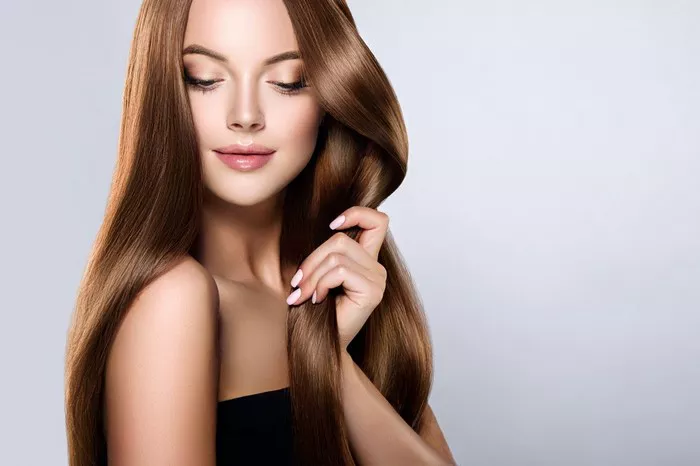Healthy hair isn’t just about using the right shampoo or conditioner—it starts from within. As a hairstylist, I’ve seen how diet impacts hair strength, shine, and growth. Hair is made of a protein called keratin, and its health depends on nutrients like vitamins, minerals, and healthy fats. In this guide, I’ll break down exactly what to eat to nourish your hair, prevent damage, and boost growth. Let’s dive in!
Protein: The Building Block of Hair
Hair is mostly protein, so eating enough is crucial. Without protein, hair grows weak, brittle, or even falls out.
What to Eat:
- Eggs: Packed with protein and biotin (a B vitamin that strengthens hair).
- Lean Meats: Chicken, turkey, and beef provide iron and zinc.
- Fish: Salmon, mackerel, and sardines offer protein + omega-3s (more on this later!).
- Plant-Based Options: Lentils, beans, tofu, and quinoa.
Tip: Aim for 1–1.2 grams of protein per kilogram of body weight daily. For example, a 150-pound person needs ~68–82 grams of protein a day.
Vitamins for Hair Growth
Vitamins play specific roles in hair health. Here’s what you need:
Biotin (Vitamin B7)
Biotin helps produce keratin and may reduce hair thinning.
Sources: Eggs, almonds, sweet potatoes, spinach.
Note: Biotin deficiencies are rare, but supplements can help if your diet lacks these foods.
Vitamin A
This vitamin keeps the scalp moist by aiding sebum (oil) production. Too little causes dryness; too much can lead to hair loss.
Sources: Carrots, pumpkin, kale, and dairy.
Vitamin C
It boosts collagen (which strengthens hair) and helps absorb iron.
Sources: Oranges, strawberries, bell peppers, broccoli.
Vitamin D
Low vitamin D links to hair loss. It helps create new hair follicles.
Sources: Sunlight, fatty fish, fortified milk, mushrooms.
Vitamin E
Acts as an antioxidant to protect hair from damage.
Sources: Sunflower seeds, avocados, spinach.
Minerals: Iron, Zinc, and Selenium
Iron
Iron carries oxygen to hair roots. Low iron = poor growth or shedding.
Sources:
- Animal-Based: Red meat, clams, oysters.
- Plant-Based: Spinach, lentils, chickpeas (pair with vitamin C for better absorption).
Zinc
Zinc repairs hair tissue and keeps oil glands working. Deficiency causes hair loss.
Sources: Oysters, pumpkin seeds, cashews, beef.
Selenium
Protects hair from free radicals and supports scalp health.
Sources: Brazil nuts (just 2–3 a day!), tuna, eggs.
Omega-3 Fatty Acids
Omega-3s reduce inflammation, moisturize the scalp, and add shine.
Sources:
- Fatty fish (salmon, mackerel).
- Walnuts, chia seeds, flaxseeds.
Tip: Eat fish twice a week or add flaxseed to smoothies.
Hydration: Drink Water
Dehydration makes hair dry and prone to breakage. Aim for 8–10 glasses of water daily. Herbal teas and water-rich foods (cucumber, watermelon) count too!
Foods to Avoid
Some foods harm hair health:
- Sugary Snacks: Spike blood sugar, which may disrupt hair growth cycles.
- Processed Foods: Lack nutrients and may cause inflammation.
- Alcohol: Dehydrates the body (and hair!).
Sample Meal Plan for Healthy Hair
- Breakfast: Spinach omelet (eggs + iron-rich greens) + orange juice (vitamin C).
- Snack: Greek yogurt with berries (protein + antioxidants).
- Lunch: Grilled salmon salad (omega-3s + veggies) + quinoa.
- Snack: Handful of almonds (biotin + vitamin E).
- Dinner: Stir-fried tofu with broccoli and bell peppers (protein + vitamins).
Common Hair Problems & Fixes
- Dry Hair: Eat more omega-3s and vitamin E.
- Thinning Hair: Check iron and protein intake.
- Dull Hair: Hydrate and add vitamin C-rich foods.
Conclusion
Healthy hair grows when your body gets the right fuel. Focus on protein, vitamins (A, C, D, E, biotin), minerals (iron, zinc, selenium), and omega-3s. Stay hydrated, avoid junk food, and give it time—hair grows about ½ inch per month. Pair a balanced diet with gentle hair care, and you’ll see stronger, shinier locks!
Related topics:
How Can You Achieve a Perfect Hairline?
How to Treat a Damaged Scalp from Relaxers?
How Can You Treat Severely Dry Hair?


